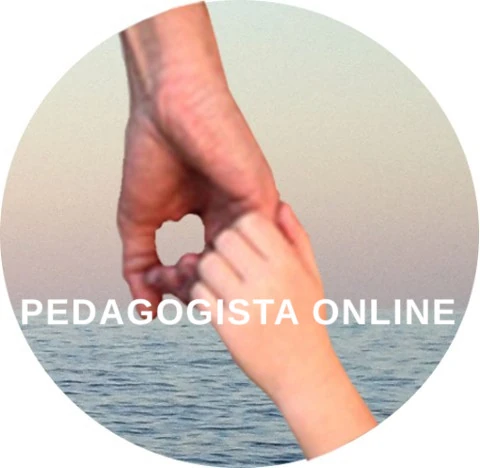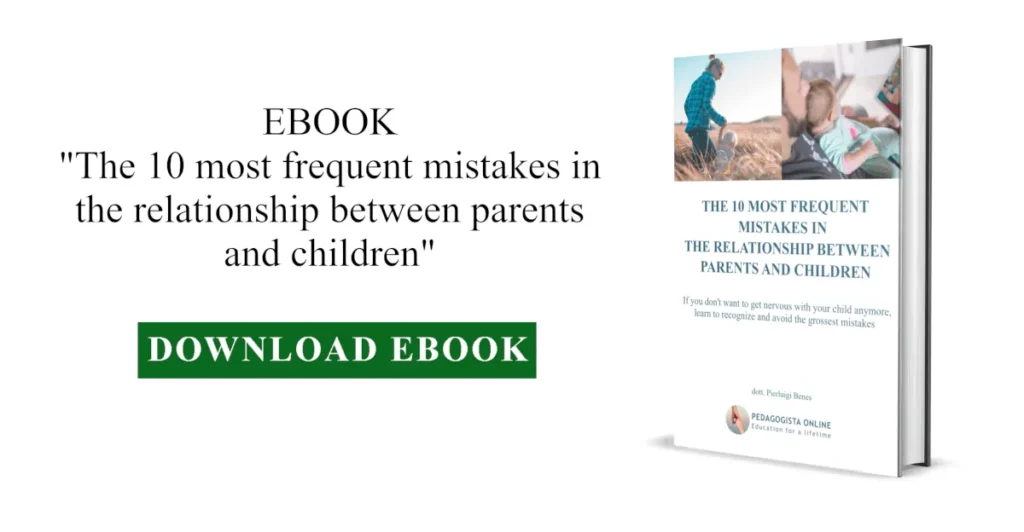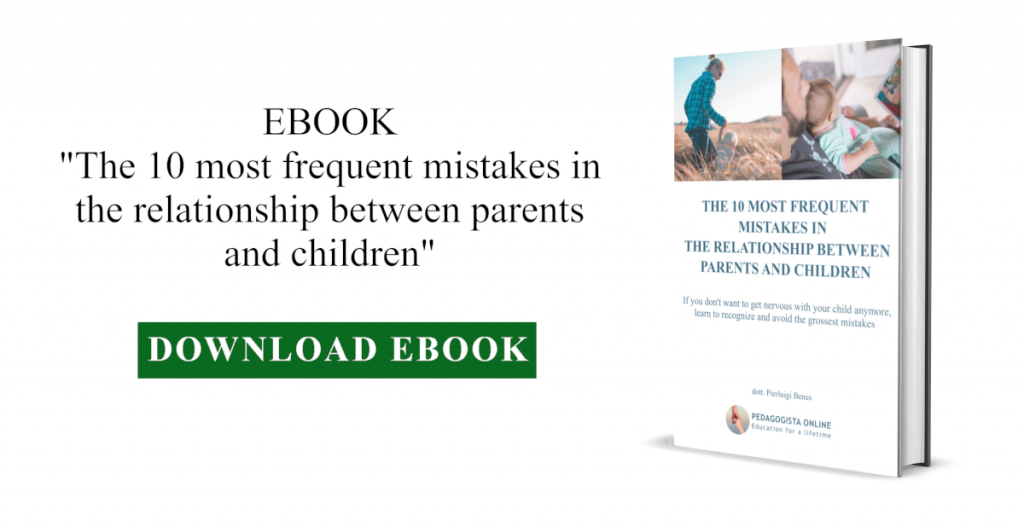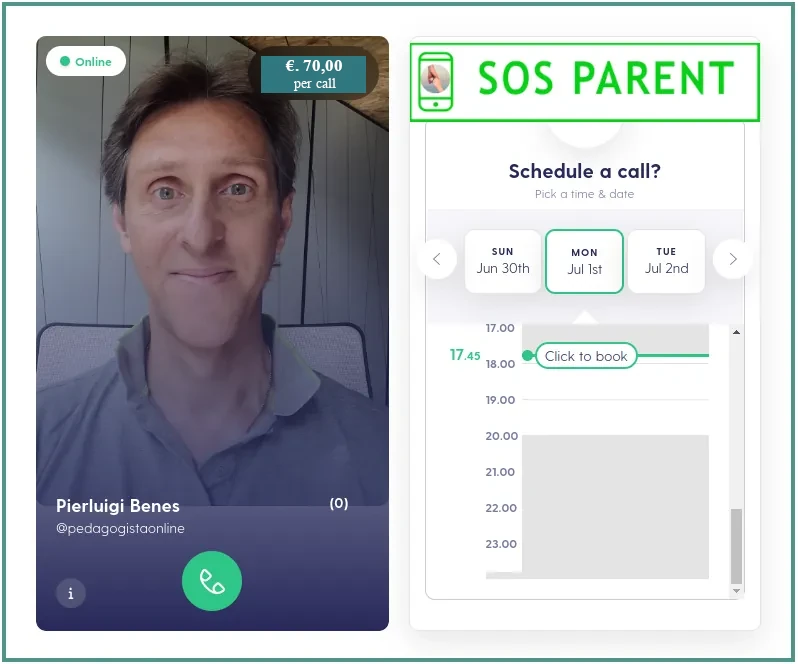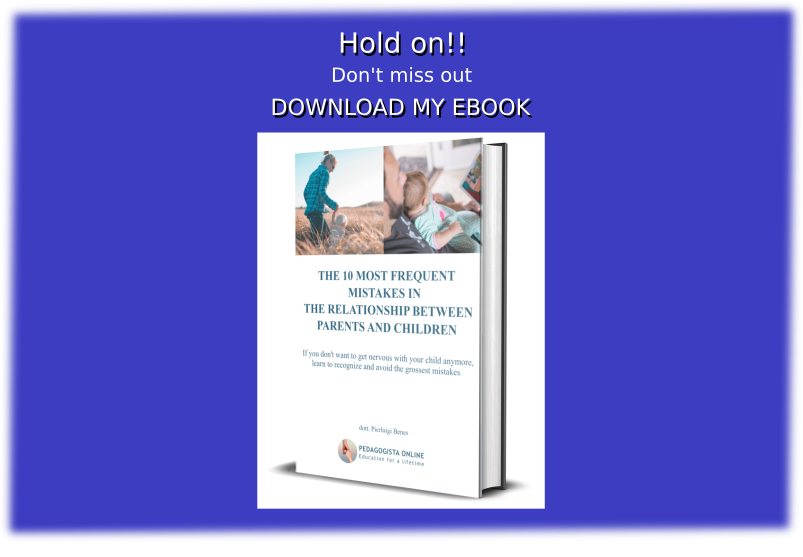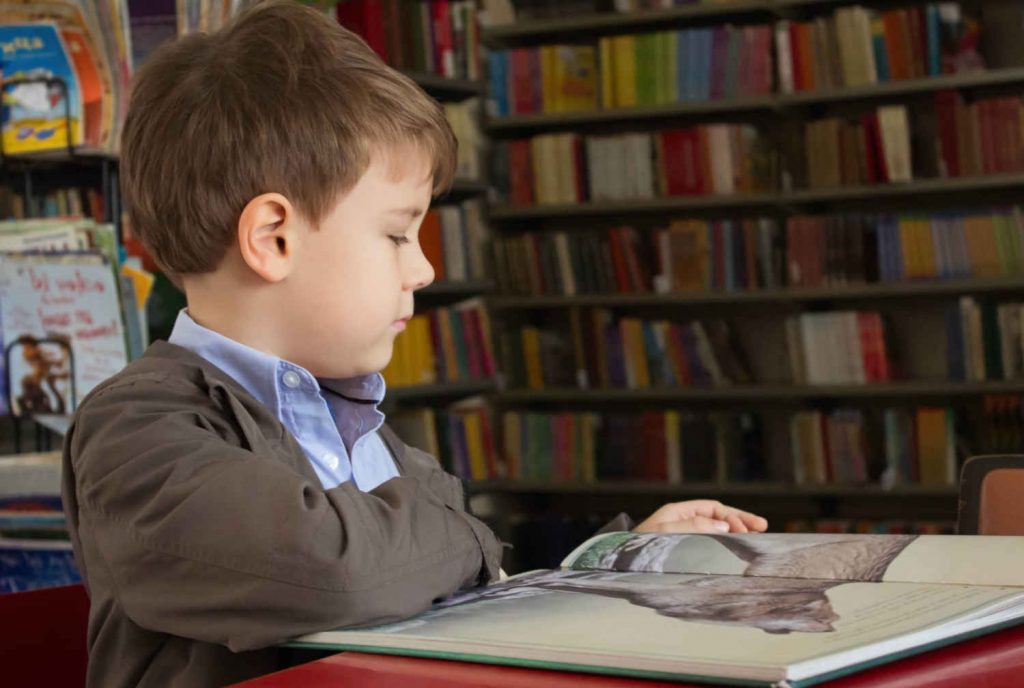
Child education is a topic that many people reflect on. Marco and Alessandra continuously question themselves about their child’s upbringing, they care a lot about their son and would like to feel more effective in the role of parent.
They have read several books and follow various blogs, but the information they obtain on childrearing is always generic: different professionals talk about it; they delve into very vague concepts; they almost always limit themselves to laying out lists of things to do/not do; they have a partial idea of education (giving rules, teaching autonomy…).
Instead, they would need tools with which to enrich the educational relationship with their child from the start.
Therefore, they continue to be confused about the meaning of education and do not know how to face the tantrums of their child, their learning, the management of the relationship they will have in adolescence, and other educational issues.
It seems that everyone knows about education, in fact, everyone says what needs to be done; however, few of them justify their reflections by explaining their reasons. Moreover, even fewer explain what education is and from which educational approach their suggestions arise.
Instead, before directing your educational role towards an approach that allows your children to express their full potential and realize themselves in life, I prefer to explain what exactly education is.
If these are your doubts, then you only need to continue reading, so that you can attribute a deeper meaning to the small daily gestures with which you aim to promote the growth of your child.
1. Child education: the mistakes of those who don't know the meaning of education
Children’s upbringing is certainly not a simple topic; many people in the past, and even today, have tried or are trying to give an answer to the question, continuously falling into superficiality. However, it is not a field in which it is possible to give a definitive answer, because education is a highly complex topic.
Some solutions may work well in certain contexts but not in others, or they may be useful for one person but not for others; therefore, extreme delicacy is required when explaining to others how to educate their children.
However, some valid general guidelines can certainly be given. What I can offer you starts from a completely different perspective from that taken by many commentators, writers or self-proclaimed education experts, who too often confuse education with other aspects. For example, with morality.
Not that they do it out of malice; if it happens it is because many of them are prey to an outdated view of education that struggles to die. Just think about the educated/ill-mannered pair; what does it make you think of? You know very well that it is a widespread custom to associate these two words with a way of behaving that is consistent/inconsistent with certain rules of etiquette.
In fact, according to this view of education, an “educated” kid is a “good” kid, that is, one who behaves well. When instead a kid behaves badly, uses vulgar language, or is rather sullen, he is considered “ill-mannered”.
This is not the only case in which education is misrepresented and confused; there is a much more dangerous one that revolves around the concept of the “well-being of children”. It is very difficult to establish what is good for children; behind this concept, too often moral precepts or preconceptions have been justified, devoid of any foundation. Not to mention the concept of the educational model, which in the past has been bent to all kinds of wickedness to force the children’s development in a specific direction, completely detached from their personal prerogatives.
Talking about models in education is very dangerous, it is a concept to be handled with care by experienced pedagogists who know the subject. These concepts, and the cultural background that accompanies them, may be fine in pub chatter; but in the mouth of some improvised education expert, this vision becomes misleading and dangerous.
On the other hand, you need to rely on a concept of education that is suitable for acting effectively towards your child.
2. Reading up, but with caution
Let’s start by saying that on this topic you will certainly find tons of books of all kinds: manuals, academic books, books by luminaries in some discipline related to education.
Being a pedagogist, it is ethical for me to tell you to read everything and more on a subject that interests you; I suggest you do the same for education, since you are here because you want to know more. However, I want to alert you. Education concerns all human beings, we are all objects and subjects of education, as I will explain shortly; but this sole aspect is not sufficient to make a person an expert in education.
We all think, experience emotions, and are capable of empathizing with others, perceiving their moods and acting accordingly to help them feel better, to lift them up if they are a bit depressed. This does not make us psychoanalysts. If we are unwell and have certain symptoms, we know that with a certain medication we could feel better; or if we are injured, we use disinfectant to prevent infections: these aspects do not make us doctors.
By this, I mean that you need to be careful about what you read or hear, because they could be crude, approximate, or perhaps interested in reproducing certain behavior patterns rather than helping you become an effective and conscious parent to your child.
For example, some years ago, in a medical practice, I found a large poster with a concise decalogue of a pediatric association, which invited, among other things, not to let children watch more than two hours of TV a day: at what age? Which programs? Italian or foreign children? To be enjoyed alone or with adults? And what about other technologies?…
I want to say that education should be approached broadly and not superficially, or approximately; otherwise, the risk is to reproduce senseless stereotypes. There would be an infinity of things to say about television; and also about the use of smartphones, social media, etc., which are now within reach of even very young children. Reducing these things to a slogan can be counterproductive.
What I want to propose to you in this context is an orientation to your role as a parent, inspired by the most advanced schools of thought in the field, which allows you to decide easily and autonomously how to manage the most important aspects related to your experience as a parent.
3. What education was in the past
That said, let’s get to the heart of how to approach education. In doing so, I will refer to Professor Franco Blezza, a real master in matter of General and Social Pedagogy, and I introduce you to a broad vision of the world we currently live in, how it was yesterday and how it is today.
My goal is to give you specific guidelines in education, allowing you to interpret your role as a parent with the utmost awareness of what you are doing.
I warn you that this is the hardest part to digest, and I deliberately chose to present it to you because without addressing these principles, it is impossible to offer you an organic set of educational tools that you can handle with due consideration.
My objective is not to tell you, “If this happens, do this, otherwise do that.” My goal is to make you a more effective parent in your role, and by the end of the reading, what you will have learned will enable you to achieve these objectives as only a small percentage of parents can do.
I want to start by making you reflect on how education was in the past, about a few decades ago. Whether you are 25, 30, or 45 years old, it doesn’t matter; you will surely have seen or heard of episodes in which a father was busy with work and often absent from home, free to come and go as he pleased without being accountable to anyone. Or when a mother was dedicated exclusively to the house and children, suffocated in a role that she may not have wanted but was assigned to her as a woman. Or where children received a very rigid or, conversely, very unregulated education, which often resulted in physical violence to resolve conflicts with the children, who were guilty of something they probably hadn’t done or understood.
I have summarized some of the elements that often occurred in the past within many families, and if we go even further back in time, these aspects were even more rigid. Think about the role that fathers, mothers, teachers, and office managers had 70-80 years ago, and how roles and responsibilities were exercised at that time. I don’t want to bore you too much on this; you have certainly already understood what I am referring to. I’m talking about what Blezza calls «homologating education».
There were models to be assumed for each role; they were very rigid, did not admit flexibility, and did not even admit the possibility of error. Just ask your grandparents how their fathers reacted when they made a mistake towards them. They will likely laugh, not even understanding the meaning of the question. These were a priori educational models:
«The educator had to impose these real and proper superior laws on the educands, and after having imposed them on himself, he had to (and could) resort to any means, even coercive, even violent, even humanly degrading, because this was always and in any case “Good” for him/her and obviously for humanity.» (F. Blezza, Education 21st century).
In the past, there was little to discuss; a father was right as a father, a teacher as a teacher, and so on. It was already all established and codified a priori, no one knew by whom or why, but it was all clear. The father worked, the mother took care of the house and children, except for punishing them, etc. Beyond the considerations that can be made about that world, what I want to point out is that those dynamics have completely changed.
This entails, among other things, that nowadays being a parent and upbringing are much more difficult than they used to be.
Don’t be frightened; on the contrary, be aware of the great human value that this has for you and your child. In the past, it didn’t mattered to most of people that children developed their potential or that parents fully developed themselves, as a man or a woman, in relation to their child, their partner, or more generally, in fulfilling themselves.
The woman had to assume a precise role, usually in the kitchen, and the man another, usually covered by a screen behind which he could/should hide his weaknesses. It immediately becomes clear why there is a worrying incidence of femicide today.
In fact, the enormous fragility developed by men over centuries inevitably had to find a way to express itself when the comfortable protective cushion of the old “rules” disappeared. We all hope that the society in which we live will soon realize this and draw the necessary conclusions.
Now let’s continue and try to make some deeper considerations about how we could understand education today. But before doing so, I would like you to reflect on when education begins.
4. When education begins
“When did your child’s education start?” is the question with which I sometimes begin meetings with groups of parents or aspiring parents, right after breaking the ice by asking for a summary of everyone’s experiences: if they have children, their ages, etc. It is a question that generally catches the audience off guard, creates a moment of reflective pause and doubt, but that allows me to immediately give people a different way of conceiving their parenting role; from that moment on, we can gradually tune in to the same wavelength.
The first answer I usually receive is that upbringing starts with the birth of the child. Others, however, respond that the actual beginning happens when the child is a little older; some say six months, some a year, some two, or simply when they reach some milestone (recognize you, interact with you, walk, etc.).
The people who give me these answers come from very different social, cultural, and professional backgrounds: teachers, employees, professionals, workers, etc., with varying ages; therefore, a very broad range of environments.
The second question I generally ask is: “Why do you think so?” Again, the answers are very varied. Some say that it doesn’t make sense to talk about education before birth; others argue that there is no proper education until there is mature interaction, but only child caring. However, some parents, and those are the ones that surprise me the most, after this second question backtrack and respond that, in fact, perhaps we could talk about education even before the first interactions, or even before birth, but it depends on what we mean by education.
At this point, we start to develop a good conversation together, thanks to which I teach them how to do their job as parents better, and they teach me to do my job as a pedagogist who helps parents do theirs best. We evolve together, thanks to each other’s reciprocal contribution; in other words, we educate ourselves.
Okay, I’m getting a little ahead of myself. Let’s take a step back and observe three aspects.
– First observation: Is it really true that interaction with the child is necessary to promote education, to upbringing, to childrearing? Just to put some initial ideas on the table, let’s say that, in common parlance, education means participating in the children’s growth process. Of course, grandparents also participate in this growth process, and not a little; a similar discourse could be made for aunts, teachers, but also for coaches and many other figures.
Often, there is not even a need to have a direct interaction to have a stimulus for growth. Think about when your child starts school; let’s say the first grade, but the discussion could also apply to the first year of any level of school.
There, they will find teachers who will take care of them, teach them many things, and help them develop tools and skills to autonomously tackle increasingly complex tasks. However, even before your children set foot in that school, before they even know their new teachers, they will already have adopted the mentality of belonging to a new community and pursuing new goals: they will behave differently, aspire to different goals, and feel different. For example, I think of my daughters when they were children and moved from nursery school to preschool and subsequent levels, how they identified with the new environment.
What I mean is that it is not always necessary for someone or something to have a direct intervention on children to create an educational effect on them. Sometimes, as you can see, simply approaching an event, a person, or an experience with our mind allows us to deeply rethink our way of living our goals.
– Second observation: Is it really true that an adult educates a child? Can the opposite also happen? And can an adult educate another adult? Based on the principle we expressed earlier, it’s clear that even an adult can be educated, and it might even be the child, possibly their own child, who educates parents. It’s a matter of perspective. If you were to ask your mother how she educated her father, she would probably laugh in disbelief. If you were to ask your grandfather how he educated his father, you might even receive a rebuke for asking such an absurd question.
Yet, today the roles have profoundly changed, as the ways in which educational processes are expressed have changed. If you pay attention, you’ll notice that the word “education” has had a strong impact in many fields, even those very far from the parent-child relationship.
Do you want some examples? Continuing Medical Education courses; environmental education; language education; physical education; music education; Individualized Education Plans; and many others. Let’s say that education has become a trend, although in many cases those who use these concepts have only a small and modest understanding of what they mean.
Regardless of what they want to allude to with these terms and how they intend to actualize their educational goals, one thing is clear, that is which motivates those who operate in these contexts: to expand their vision of that subject in a more far-sighted way than simple instruction (health, music, etc.). Essentially, their objective is not only to instruct people, but above all to promote their growth, whether it’s that of adults or children. In summary, we can say that today everyone educates everyone, and everyone is educated by everyone.
– Third observation: Is it really true that education begins with the birth of the child? At this point, you are likely giving yourself the answer: No! Or rather, we could say yes if we’re referring to the way we act towards the children: until they are born, or at least until they are conceived, there is simply no interaction with them. But for the reasons we mentioned before, we say no, because we admit that education is a phenomenon that involves everyone, adults and children reciprocally.
We will return shortly on these concepts; what I want to highlight now is that education encompasses a very broad range of processes, and there is not one figure who educates and another who is educated. That was how it once was, but today it’s completely different.
Assuming that parenthood was a choice, when a person decides they want to have children, they have already started thinking differently. Before deciding to become parents, there are other ways of living life, other goals to pursue, another way of speaking between partners. Then something changes; day after day, the need to have children becomes apparent and one begins to fantasize about how it would be. From there, they start planning life as a family of three or more, imagining that it would be necessary to downsize certain aspects of their life after the birth, to bring some of those energies spent outside the home back within the domestic walls, whether it be sports, friends, or extra work.
Of course, it’s not always like that; in many cases, it’s not possible to downsize one’s commitments, other times it’s not wanted; other times, one partner downsizes their life while the other refuses to. In short, a forthcoming birth profoundly changes life. So does it make sense to think that education is imparted solely by the parent to the child? Does it make sense to think that education begins with the birth of the child? It’s hard to believe.
Now let’s try to summarize what we’ve said in a way that allows us to have a clearer idea of what it means to educate today.
5. What education is today
The etymology of “to educate” means “to lead/draw out” and refers to a person’s talents and abilities, which are brought out and developed. One of the most authoritative Italian pedagogists, Professor Piero Crispiani, defines education as «helping in the development of personality». I find this to be the simplest and most evocative way of expressing this natural human prerogative; in fact, parents accompany their children’s growth to help them bring out their attitudes and become adults ready to face independent life.
Furthermore, this definition could be use and applied in every possible context: family, school, professional, rehabilitative or therapeutic fields. In fact, the principle of helping development applies to all educational contexts, not just the family: it works in school, in social contexts, in vocational training, and in any context in which help is needed for human development to occur. Children, adults, elderly, disabled, students, parents, workers, are all people who need help with their personal growth.
At this point, we can take the next step and ask how to educate: what strategies, what tools, what resources are needed? The way I propose starts from the definition of education we have just seen and is realized through a democratic educational approach. It is a vision of education centered on the child and aimed at allowing them the best possible development, that is, the maximum expression of themselves and their attitudes.
It may seem obvious, but I assure that it is very common both among parents and among teachers and other helping professions to focus on their own educational aspects rather than on those of the child, which denotes a non-democratic educational approach.
If I educate you because I want you to achieve a result that I have decided in advance, starting from my aspirations for you, then I am not educating you, I am training you to achieve goals that are not centered on you. If, on the other hand, I start from you and what I observe in you day after day, reflecting on your needs and how to allow you to realize yourself, then my educational approach is really centered on you.
6. Education is first and foremost self-education
The logical consequence of the fact that everyone educates everyone else is that ultimately, everyone educates themselves. Now let’s try to delve deeper into this, but it is important not to forget that education is not always an intentional process.
In fact, many educational experiences are entirely accidental; even when you intend to carry out an educational action towards your children, you cannot be sure of all the effects that action will have on them.
You can control some aspects, you can anticipate a context with certain characteristics and appropriate stimuli; however, the way in which these will be experienced, received, and metabolized by your children depends mainly on them.
Once children were thought of as tabula rasa, a blank slates to be molded at will. Actually, it is not like that at all, children actively participates in every single experience that is presented to them. They interpret it with the tools at their disposal and make their own the aspects they deem most interesting.
Therefore, the parent’s ability lies in understanding the characteristics of their children and stimulating their self-education abilities in the most appropriate way possible, to enable them to express their talents.
If you are able to focus on this educational principle at every stage of your parenting experience, the effects you will be able to produce on your children will be extremely rewarding for your entire family.
7. Who is the education specialist
I conclude with a consideration on the figures who have the title and competence to deal with education. I do this because educational processes are an extremely delicate subject that requires solid educational foundations in order to express useful reflections to improve the relationship between parents and children.
There are two competent professionals in the field of education: one has a first-level university education and is the Educator, while the other has a higher-level education and is the Pedagogist.
All other figures, even those who specifically deal with individual disciplines among those included in all educational sciences (psychology, sociology, anthropology, etc.), have only a partial perspective to effectively manage educational processes. Therefore, I suggest that you pay close attention to not being influenced by suggestions that other professionals may give in the field of education.
The education specialist is the Pedagogist, who is a professional trained to observe, analyze, and manage the processes of human development, and is the main reference for those who want to expand their educational skills.
That being said, if you want to deepen your pedagogical training to avoid getting nervous with your child, you can download the ebook that I am making available to you for free.

